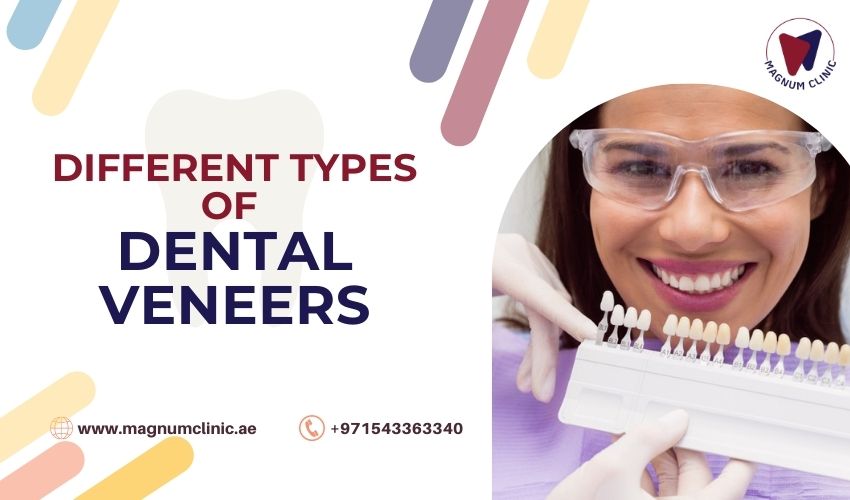What Are the Different Types of Veneers and Their Pros and Cons?

Do you envision the ideal smile? However, do you have teeth that are misaligned, chipped, discolored, or have large gaps between them? To address these issues, different types of dental veneers are available.
Veneers are a valuable tool in cosmetic dentistry for achieving an improved smile. They have the ability to enhance the appearance of teeth by providing a beautiful, white smile, as well as reshaping teeth and closing gaps between them. Veneers not only protect the underlying tooth but also contribute to an enhanced overall smile. They are commonly recommended for addressing minor cosmetic concerns such as tooth discoloration, tooth fractures, or tooth gaps, often referred to as "Smile Makeovers."
Different types of Dental Veneers
Dental veneers come in a wide range of types. Here are the different types of veneers and the cost of customising them for you. This article explains each of the several categories.
- Porcelain Veneers:
Porcelain veneers are the most commonly used type of dental veneer because they are crafted from tooth-colored ceramic material. Not only do they resemble natural teeth, but they also offer support for biting force. These veneers are considered highly compatible with the body, as they do not cause allergic reactions. When compared to other available veneers, porcelain veneers are believed to be durable and have a long lifespan.
- Composite Veneers:
Dental veneers are also made using a composite material that combines both organic and inorganic elements. The organic components consist of a coupling agent, an initiator, and resin. The inorganic material used as a filler does not cause irritation to the surrounding tissues. In contrast to porcelain veneers, composite veneers are more cost-effective. However, the application of composite veneers usually involves some degree of tooth reshaping or trimming.
- Lumineers:
Lumineers require very little tooth preparation because they are made of an ultra-thin porcelain substance. Although lumineers are thin, bonding them to the tooth's surface gives them a more realistic appearance.
- Removable Veneers:
These veneers are temporary and can be taken out when desired. They are typically made from acrylic and offer a non-invasive alternative for improving the appearance of teeth.
- Traditional Veneers
Either porcelain or composite resin make up these veneers. To prepare the tooth for veneer application, they necessitate a sizable degree of tooth reduction.
- Non- Invasive Veneers
These are made of translucent ceramic material that can be custom made to solve various dental issues. They are usually used by people with sensitive teeth. As they are ultra they fit better and don’t require the removal of tooth enamel.
The Advantages and Disadvantages of Dental Veneers
Advantages of Veneers:
1. Improved Aesthetics: Veneers can significantly enhance the appearance of teeth by improving their color, shape, and alignment. They provide a natural-looking, aesthetically pleasing smile.
2. Stain Resistance: Porcelain veneers are highly resistant to stains, allowing patients to enjoy a bright, white smile for a long time. This makes them a great option for individuals with discolored or stained teeth.
3. Durability: Veneers, especially porcelain ones, are durable and can withstand normal biting and chewing forces. With proper care, they can last for many years.
4. Conservative Approach: In some cases, minimal tooth preparation is required for veneer placement, preserving more natural tooth structure compared to other dental restorations.
5. Easy to Do and Maintain: No matter what type of Veneers you go for, it is easy to do and easy to take care of. You need not worry about the aftercare of Veneers. You can just get it done in one, two or a few visits and enjoy gushing about your new and improvised teeth. Moreover, Veneers’ procedures are not like bridges or crows; they don’t require any kind of removal but preserve your natural tooth structure.
Read More: Benefits Of Veneers Treatment
Disadvantages of Veneers:
1. Irreversible Procedure: To accommodate veneers, a small amount of enamel may need to be removed from the teeth. This irreversible process means that once veneers are placed, the teeth will always require some form of restoration.
2. Cost: Veneers can be relatively expensive, especially porcelain veneers. The cost varies depending on factors such as material, location, and the number of veneers needed.
3. Sensitivity: Some individuals may experience temporary tooth sensitivity after the placement of veneers. This sensitivity typically subsides over time, but it's important to discuss any concerns with a dentist.
4. Replacement: Although veneers are durable, they may need to be replaced after a certain period, typically between 10 to 15 years. This is due to normal wear and tear or potential damage.
It's crucial to consult with a qualified dentist to understand the specific advantages and disadvantages of veneers in your particular case and make an informed decision based on your dental needs and preferences.
Conclusion
Overall, dental veneers are a flexible and durable choice for anyone looking to improve the look of their teeth and have a more appealing smile. Veneers can significantly and permanently enhance dental appearance with the help of a professional dentist and with the right maintenance.
Transform your smile with Magnum Clinic: Book your consultation today!
